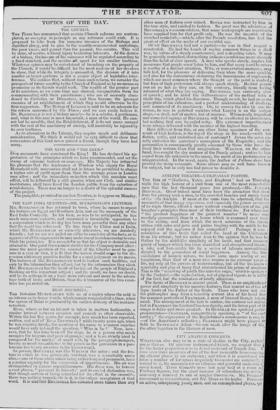BEAU BRUMMELL.
THE historian MuNcHAusEN tells us of a region where the cold is so intense as to freeze words, which remain congealed till a thaw, when the uproar of Babel is produced by the sudden delivery of the iced con- versation.
Here, where so hot an interest is taken in matters fashionable, a similar interval between occasion and remark is often observable. Within the last five years, for example, how much has been reported, written, and said of Beau BRUMMELL ? while twenty years ago, when he was reigning- dandy, the mention of his name in common societies would have only induced the question, " Who is he ?" Now, how- ever, that he has long been off the stage, be is a person who much occupies the tongues and pens of gossips ; and a beau strictly ideal is composed for the market of small talk, by the paragraph-mongers, having as much resemblance to the person as the pantaloon in a pan- tomime has to any creature in the known world.
In person, BanerarELL was like WitseNcst the actor ; and the fea- ture to which he was principally indebted, was a remarkably saucy chin,—one of those chins which being rather long and prominent, have a peculiar capacity for the expression of impertinence. His air was distinguished by a grave superciliousness. His dress was, to borrow a cant phrase, " personal to him-elf;" and its envied distinction was, that though certain of being remarked for its effect in the ensemble, there was nothing remarkable in it, in the vulgar acceptation of that word. It is said that BRUZDIELL has educated more tailors than any other man of fashion ever ruined. STULZ was instructed by him in the true style, and raished to fashion. So great was the advantage of BRHMMELL'S recommendation, that some tradespeople are reported to have supplied him for that profit only. He was the inventor of the starched neckcloth,—which, after the French revolution, has had the
greatest effeage.ct on the necks of our eventful age. e •
Of wit BRUMMELL had not a particle—he was in that respect a counterfeit. He had the knack of saying common things in a droll way, by virtue of a steady countenance. and a drawling voice. It may be generally remarked, that nothing indicates confidence more strongly than the habit of slow speech. A man who speaks slowly, implies the assurance that people must listen to him, and that every word he utters is worthy of a distinct attention. 1Vits, or conversation-mongers, may talk fast, for the pleasure of delivering their ideas the more quickly, and also for the convenience of slurring the inaccuracies of expression, which are most common where the thought or the point is studied; but fops of high pretension will always speak slowly. Bashful people run on as fast as they can, on the contrary, literally from feeling ashamed of what they are saying. BRUMMELL was eminently slow of speech ; and he aided the deliberateness of his method with a slight lisp, which glued his discourse. Though no wit, he had an acute perception of the ridiculous, and a perfect understanding of drollery, and command of its machinery. Or, to convey the idea by one in- stance, he was in polished societies what LiseoN is on the vulgar stage,—a droll, not of matter, but of manner. Whimsically impudent and conceited sayings of BRUMMELL will be recollected in abundance, but nothing that can be called witty. His extremest impertinences were always delivered with the manner of the highest breeding. How different from this, or any other living specimen of the cox- comb of high fashion, is the fop of the stage or the novel,—with his flutter, rattle, and underbred airs of contempt ! JONES the actor ex- actly embodies the garreteer's conception of the Exquisite ; and his personation is consequently greatly esteemed by those who have de- rived their notions from that imagination. WRENCH, on the other hand, has caught the dry manner of the Dandy school; and as he has copied from life unknown to the many, the merit of his performance is unappreciated. In the novel, again, the Author of Pelham alone has painted the living coxcomb. Some others may as well have known' the subject, but he only has had power to -describe it.


















 Previous page
Previous page